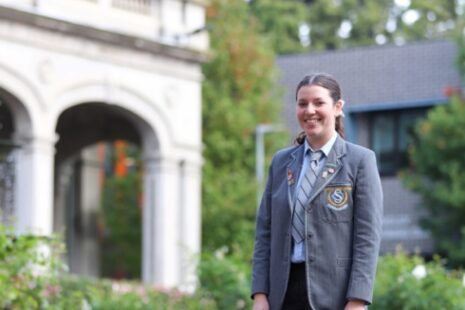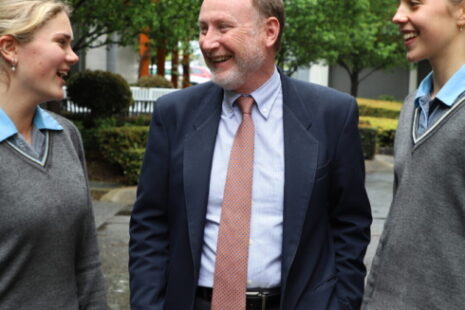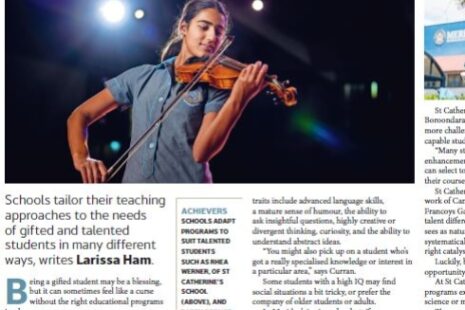What will the world be like when my daughter graduates?
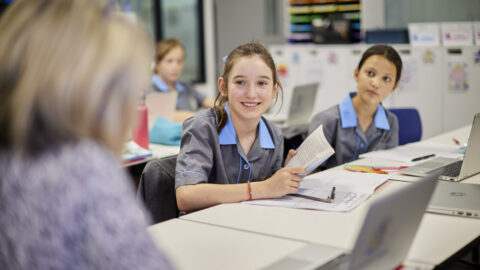
What will the world be like when my daughter graduates? I am sure this is a question all St Catherine’s parents regularly ask themselves and was definitely what many families were pondering as they joined us today as St Catherine’s welcomed over 40 families onto our School grounds to tour our campus and see, first-hand, what life at St Catherine’s could look like for their daughters.
Over the past two years our Open Mornings and Tours have been limited or cancelled due to COVID restrictions. Whilst we pivoted marvelously by offering online tours as the next best alternative, the chance to once again open our School to families, and share our learning culture, enthusiastic students and teachers, and wonderful facilities was a joy.
During events such as these parents are able to seek information about our School direct from our student leaders and staff, and discover how our School will educate and equip their daughters with the capabilities and skills they need to thrive in the world, post-school.
Using our current Prep students as an example, by the time they graduate in 2034 and commence life outside of St Catherine’s, the world in which they operate will be drastically different, with the pace of technological innovation continuing to evolve the world of work, and how we live at exponential rates. Some futurists predict by 2034:
- Every individual will be connected to 16 devices;
- Trains will travel three times the speed of airplanes;
- The majority of vehicles will be enabled with vehicle-to-vehicle communications; and
- Artificial Intelligence and automation will reduce the number of human-only jobs
In the recent, The Future of Jobs Report 2020, the World Economic Forum predicts by 2025, “85 million jobs may be displaced by a shift in division of labour between humans and machines, while 97 million new roles may emerge that are more adapted to the new division of labour between humans, machines and algorithms.”
In line with the changing landscape of human-only jobs, the skills required within these new and emerging roles include, “critical thinking and analysis…problem-solving, and skills in self-management such as active learning, resilience…and flexibility,” according to the WEF.
As a School it is essential we continually adjust our educational offerings to ensure we are preparing the young girls in our care for what their futures will look like. For our Class of 2034, it is clear they will be required to be agile and critical thinkers, and possess higher-order thinking skills to be successful in a world of work which sees humans and machines working side-by-side.
In Barbreck, our Thinking Classroom approach prepares your daughters for their futures. Our girls are taught to question, interpret, analyse, reason, evaluate, explain, hypothesise, and appraise across all subjects. They are taught complex thinking routines and strategies on how to approach their thinking, how to apply diverse ways of thinking to tackle problems and new information, and how to critically question what they see and hear.
Through this deeper learning, students can articulate their thinking, establish intellectual connections between concepts and across subjects, and better appreciate the bigger picture, all essential skills for life in the 21st Century. Within Barbreck we envision our graduates to be the minds of the future, the builders of these great future technologies, the collaborators and the problem-solvers.
These higher-order thinking skills take time to develop. With this in mind the focus of our teaching in Barbreck ensures thinking skills and routines are integrated across all subjects, and are built upon as the girls progress through St Catherine’s – from our Early Learning Centre through to Year 12 in our Senior School.
Our focus is informed by the Australian National Curriculum, and extended through St Catherine’s signature programs including Project Zero, a Harvard Graduate School of Education resource, and our partnership with the University of Queensland’s Critical Thinking Project.
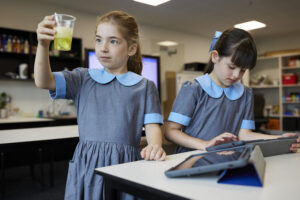 One of the thinking routines implemented within Barbreck from Harvard University’s Project Zero is See, Think, Wonder. Students are asked to think deeply about what they see, what they think, and what makes them wonder? Girls are asked to think carefully about why something looks the way it does or is the way it is. This helps stimulate the girl’s curiosity and sets the scene for inquiry. This thinking routine provides significant depth to a student’s approach to learning and can be applied across numerous subjects, such as STEM or HASS (Humanities and Social Sciences).
One of the thinking routines implemented within Barbreck from Harvard University’s Project Zero is See, Think, Wonder. Students are asked to think deeply about what they see, what they think, and what makes them wonder? Girls are asked to think carefully about why something looks the way it does or is the way it is. This helps stimulate the girl’s curiosity and sets the scene for inquiry. This thinking routine provides significant depth to a student’s approach to learning and can be applied across numerous subjects, such as STEM or HASS (Humanities and Social Sciences).
Recently in STEM, the girls utilised See, Think, Wonder when experimenting with detergent, oil, and water – analysing, hypothesising, and communicating their observations as they combined the differing liquids. In HASS, our Year 5 Study Tour to Sovereign Hill presented an opportunity for the girls to really think about what they were seeing, linking it to their prior knowledge, and then wondering about many aspects of life at that time.
To think is to learn, and the quality of one’s thinking processes impacts the quality of their learning. At Barbreck, we work to ensure girls are taught how to think deeply and how to think well. They have opportunities in every subject to use and apply their cognitive skills productively, intentionally, and purposefully so they can thrive and contribute meaningfully to the world in which they find themselves.


